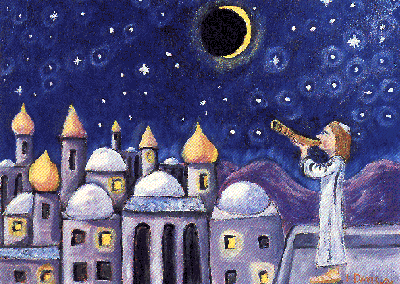What is Rosh haShana?
Our sages gave this name to the 1st day of the 7th Biblical month, which is called Tishrei in Jewish calendar (Tishrei תשרי derives from the Akkadian language and means “the beginning”, directly related to the Hebrew ‘Reshit’ ראשית).
In Scripture it is called Yom Teruah יום תרועה (the day of sounding [shofar]) (cf. Leviticus 23:24, Numbers 29:1), and it’s commonly known as the famous Judgment Day (yom haDin, cf. Psalm 81:5, mishna Rosh haShana 1:2), and the day in which every person is sealed with their mazal – their fate (cf. Bava Bathra 10a).
Our Rosh haShana רֹאשׁ הַשָּׁנָה ─ which is an expression used in Scripture (Ezekiel 40:1) although in reference to a Jubilee year ─ is one of the four different new years in Judaism, each one serving their own purpose; the main two being Nissan (1st month) and Yom Teruah (7th month). In the case of Yom Teruah, its aspect as “Rosh haShana” (literally, Head of the year) is derived from Nehemiah 8:1-8 and other Torah verses:
It is called in Torah “the festival of gathering, at the year-season” (Exodus 34:22), and also “the going-out, i.e., changing, turning of the [agricultural] year” – tzeit haShana (Exodus 23:16).* When the flood came into the earth in the time of Noah, it is written it took place on the 2nd month of the year (Genesis 7:11). But Nissan was not the first month in Israel’s calendar until after the Exodus in which God specifically says that from that moment on “this month (Nissan) shall mark for you the beginning of the months” (Exodus 12:1-2), that is, in relation to redemption. First month since redemption, second month since redemption, and so on and so forth. In this case, Tishrei is the 7th month from redemption.
So what about the days of Noah? Noah’s calendar was counted from the birth of Adam (cf. Sanhedrin 38b). When it says Adam lived 930 years, it’s because time began to be calculated in his birth. Therefore, our sages explain Rosh hashana is the birthday of Adam Rishon, and the “second month” in which the great flood took place was the month after Rosh haShana, so when it says the ark rested on mount Ararat on the seventh month (Gen. 8:4), it doesn’t refer to Tishrei, but to Sivan (cf. Seder olam rabba 4, Mishna Rosh haShana 1:1; Rashi on Genesis 8:4).
Note: the permutation of “Bereshit” בראשית (Gen. 1:1) gives us “Alef beTishrei” א בתשרי (1st of Tishrei).
The commentator Ramban thus explains the difference between the two Jewish heads of the year:
Nissan… is not the REAL beginning of the year in cosmic terms. Nissan is the “beginning for you”, for it is thus called in memory of our redemption, whereas Tishrei is the seventh month counting from redemption, but the first month in cosmic terms, since it’s mankind’s birthday.
Karaites and Christians tend to accuse Judaism to incorporate pagan months into their calendar and claim Rosh haShana is an adopted pagan new year. I believe this to be mostly reactionary against a Judaism they don’t want adherence to. Demonizing the Rabbis is a common theme in their interpretations. It is certainly true that Jewish months got their modern name from Bavel (cf. Yerushalmi Rosh haShana 1:2, 56d), yet there are two things to consider: first, even in the Bible itself these Babylonian names for the months are used both for comfort and for easy understanding, having nothing pagan about it: “1st month, which is Nissan” (Esther 3:7).
Claiming we can’t use those names is like saying that we should never say “Monday” or “Tuesday” because these names come from Roman traditions, which is absurd; only fanatics would have such a radical approach. Since the Jews were exiled to Bavel, it’s just natural they adopted the Babylonian names of the months. Notice in 1kings 8:2 Tishrei is called by its Canaanite name (Ethanim) due to the passage’s historical context. It’s simply natural.
Concerning the idea that Jews adopted Yom teruah as new year because Tishrei was the Babylonian new year, we have already seen where did our sages see Rosh haShana as new year inferred from the Torah; it predates the Exodus, so it shouldn’t be awkward that other ancient civilizations also followed a similar calendar structure. In fact in many Middle East cultures the beginning of Autumn was the beginning of the year, and the reason was agricultural, not religious. For the Jews, it was the beginning of the harvest (Exodus 23:16).
People think Israel were ignorants prior to the giving of the Torah, but the truth is Israel carried with them the baggage of an ancient culture that they (and many other Middle Eastern cultures) received from Noah.
The last thing to consider is Divine Providence. Our sages understood that these names, which are also used by the Biblical authors through ruakh haQodesh ─ divine inspiration ─ had a spiritual meaning and were not merely informative. In Judaism every word in the Bible is considered sacred and educational. Finally, Judaism is a tribal/communal experience, we don’t freestyle and go “solo”; we may have dissenting opinions and different theological branches, but we celebrate feasts together as one people, in harmony and in accordance with the “elders”, who are the ones with authority to determine hallakha (Jewish law). They are the ones sitting at Moshe’s seat.
Gmar hatima tova
-Xus Casal-

